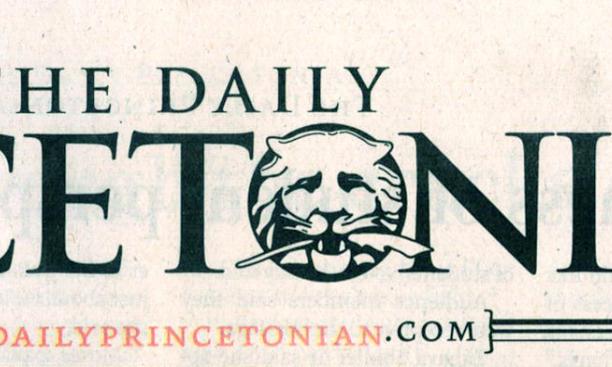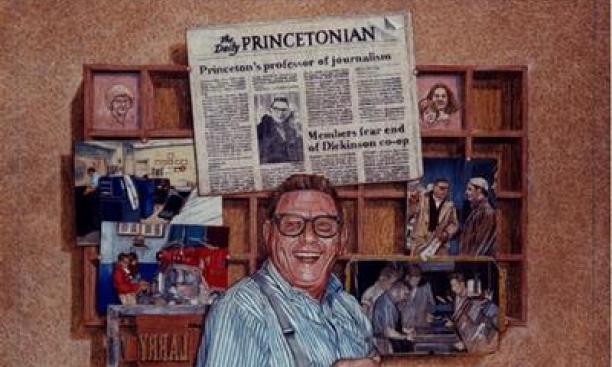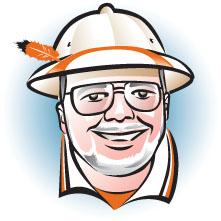

Since its advent in 1876 (trumpeted incessantly atop its Tiger-and-Quill banner), The Daily Princetonian has, let’s cut to the chase, been the primary contemporary source of the history of the college and the University. The New York Times and other instant journals of civilization – in 1910 the Grad College fight between Woodrow Wilson 1879 and Andrew Fleming West 1874 was a front-page item – have steadily broadened and become distracted by such remote ephemera as Afghanistan and nuclear warheads. The Packet, Town Topics, and other local media are wildly insufficient in detail and topic selection. University house organs of various sorts are, well, house organs, and Your Favorite Periodical is targeted to a peculiar constituency – and if you don’t think alums are a peculiar constituency, you haven’t read my e-mail – that colors its story selection, if not its journalism.
But most important, the Prince is a truly collaborative product that’s as close a thing to Wikipedia as deadline history can get: Since there’s 100 percent staff turnover every four years, the number of hands involved in the paper over 134 years has been well into the thousands, and its ability to capture quick-moving campus fixations is simply unmatched. While the precision of any given article may be a bit dodgy (another commonality with Wikipedia), it looks increasingly like a pillar of strength in a Facebook-muddled world. Should you take a trip to the reading room of Mudd Library and check out an alumnus or faculty file from the archives, you are liable to be reading predominantly Prince text (written with a hangover on three hours’ notice 70 years ago, but hey ...), and, in many cases, not a lot else besides the ubiquitous PAW Class Notes and memorials.
The bad news has always been that you had to go to Mudd to do that; prior to the online Prince archives in 2002, the back issues existed in faintly searchable form only in the archives, on chronological microfilm. So if you wanted to check a topic and had no idea on what date your target event(s) happened, you were condemned to the purgatory of reeling around more than a fiddler at a barn dance, as granddad used to say. And while the image of me floundering around in the itty-bitty microfilm room may cause you to smile (thanks, Mom), you can also see that this was a qualitative impediment to Real Historians and their interpretations of the University and its place in the world.

The good news is that those days are vanishing. The Prince trustees and the archives have undertaken a huge task: the searchable online Prince, going all the way back to day one. Named inspirationally for Larry DuPraz, the lovingly colorful guiding light of the paper for over half a century, the archives open a rich historical window to Princeton from anywhere there’s a Web connection, and it’s a picture window at that. Not content with simply getting the text of the thousands of issues online, the DuPraz archives contain full images of every page from the originals, with all text searchable (you can find 2,678 citations for Jack Honore’s fabulous barber shop, for example). This is not an easy technical task; it involves laborious processing of the original, often physically unstable pages in a complex path from Canada to Cambodia to New Zealand to get them in shape for posterity. The database is currently up to 1967 and on the way toward 2002. To say that it’s worth this fastidious process is laughably understated not only to you, the Concerned Historian, but to just about anybody who’s spent time at Princeton over the years.
To pick a current example out of thin air, let’s consider Bud Schmucki ’41 p’74 p’82, one of the most devoted Princetonians of the last half-century. During the workday, he was the fifth recording secretary of the University (keeping track of donors and – here’s the dark downside – trying to keep them happy). Off the clock, he did a pile of volunteer work for Princeton, and was a stalwart part of the Princetoniana history wing of the alumni body, too. His death Aug. 2 saddened a huge number of his friends and beneficiaries in the Princeton family, and he’ll be sorely missed. Unlike six months ago, we can turn to the DuPraz archives and browse through Bud’s undergrad years. He appears on Oct. 19, 1937; his freshman physical is scheduled for 8:30 a.m. (along with Russell Train, who would go on to become the EPA administrator and founder of the World Wildlife Fund). From there we follow him through intramural hockey and keycepting with Orange Key (remember keyceptors?), many adventures in Triangle (redundancy alert), work with the economics faculty and at the Blairstown summer camp, and bickering into Dial Lodge. But there's nothing online yet about his time as a University staffer, since the database doesn't go beyond 1967.
Thus the big finale: The DuPraz project needs a few more bucks to finish its chronicles through 2002. An underestimate of the number of pages involved (I can think in retrospect of some editors who could have tightened up the content, but it’s a bit late for that) has left the trustees and archives a little short. So get out your stack of Krugerrands and send a few to the archives, and let’s get the Princefiles and the archives up to snuff. Then you can DuPraz yourself, find out all the stuff about your college years that you “forgot” about (cue the psychology department), and decide whether to legally change your name before your next job change. You’ve been warned.

